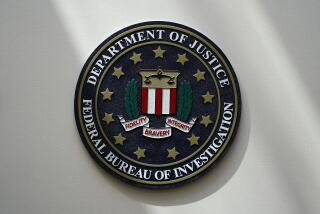3 Pakistani men charged in failed Times Square bombing
- Share via
Reporting from Islamabad, Pakistan — Pakistani authorities have charged three men with terrorism-related offenses for allegedly helping failed Times Square bomber Faisal Shahzad prepare for the attempted May 1 attack by arranging meetings with top Pakistani Taliban leaders and sending him money, a senior police official in Islamabad said Wednesday.
The three men, Shahid Hussain, Shoaib Mughal and Humbal Akhtar, are relatively young, middle-class Pakistanis who have been close friends with Shahzad for several years, said Deputy Inspector Gen. Bin Yamin. They allegedly facilitated Shahzad’s training at Taliban boot camps in Pakistan’s largely ungoverned tribal areas and arranged for him to meet with Pakistani Taliban leader Hakimullah Mahsud.
When Shahzad ran short of money in the U.S. as he prepared for the bombing attempt, the three men sent him $13,000, Yamin said.
Yamin said the men gave investigators lengthy confessions and had been formally charged with criminal conspiracy to commit terrorism. Though Yamin said the men had been arrested just recently, their detention by Pakistani authorities had been reported soon after the May 1 attempted car bombing.
Shahzad, a 30-year-old U.S. citizen, has pleaded guilty to attempting to detonate an SUV loaded with propane tanks and fertilizer in Times Square. The failed bombing marked the first time the Taliban had tried to carry out an attack outside of its homelands in Pakistan and Afghanistan.
The son of a retired vice air marshal in the Pakistani air force, Shahzad had been living a suburban lifestyle as a father and financial analyst in Connecticut before his radicalization brought him to Pakistan’s tribal areas for terrorist training. During a court hearing in Manhattan, he told a judge that he saw himself as a “Muslim soldier.”
Yamin said the three Pakistani men had close ties with Mahsud and other leaders of the Pakistani Taliban, an insurgency closely allied with the Afghan Taliban and the Al Qaeda terrorist network.
Yamin would not elaborate on evidence gathered against the men, though he said important information about their activities was gleaned from a computer they used.
alex.rodriguez@latimes.com
More to Read
Sign up for Essential California
The most important California stories and recommendations in your inbox every morning.
You may occasionally receive promotional content from the Los Angeles Times.













